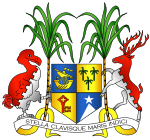2010 Mauritian general election: Difference between revisions
m use english for party names |
No edit summary |
||
| Line 8: | Line 8: | ||
Around 900,000 people were eligible to vote in the election.<ref name="AFP" /> The counting of votes began on 6 May with results expected by that afternoon.<ref name="AFP" /> With 30% of votes counted the Alliance de l’Avenir was ahead in 40 of the seats and the Alliance du Coeur in 19, though no seat had yet been declared. Turnout was estimated at 78%, down from 81.5% in 2005's election and the lowest turnout since 1976.<ref name="bloom" /> The electoral commission said that the voting process went well and there were no formal complaints.<ref name="bloom" /> |
Around 900,000 people were eligible to vote in the election.<ref name="AFP" /> The counting of votes began on 6 May with results expected by that afternoon.<ref name="AFP" /> With 30% of votes counted the Alliance de l’Avenir was ahead in 40 of the seats and the Alliance du Coeur in 19, though no seat had yet been declared. Turnout was estimated at 78%, down from 81.5% in 2005's election and the lowest turnout since 1976.<ref name="bloom" /> The electoral commission said that the voting process went well and there were no formal complaints.<ref name="bloom" /> |
||
This election was marked by accusation from Paul Berenger of abuse of the state owned television station, the [[Mauritius Broadcasting Corporation]], by the incumbent government<ref>http://www.lexpress.mu/story/11559-couverture-politique-par-la-mbc-berenger-veut-interpeller-la-commission-electorale.html/</ref>. |
|||
== References == |
== References == |
||
Revision as of 12:31, 6 May 2010
 |
|---|
| Constitution |
General elections were held in Mauritius on 5 May 2010.[1] The main parties running were the Mauritius Labour Party under Dr. Navin Ramgoolam, the Mauritian Social Democrat Party under Xavier Duval, the Militant Socialist Movement under Pravind Jugnauth and the Mauritian Militant Movement under Paul Berenger, who ran for his last term as party leader. The elections were the ninth to be held since independence from the United Kingdom in 1968.[2]
The Mauritius Labour Party, the Mauritian Social Democrat Party and the Militant Socialist Movement joined together into an alliance called Alliance de L'avenir (English: Alliance for the Future) for this election.[3] Before the election, it appeared that Berenger might gain back the PM's post that he held from 2003 to 2005, he was the first prime minister since independence that was not of South Asian origin.[4] Berenger led his own alliance of parties, known as the Alliance du Coeur[5] (English: Alliance of the Heart), a reference to the official logo of the Mauritian Militant Movement, by far the biggest party in that alliance.
During the election 62 seats in the National Assembly of Mauritius were contested with a further 8 seats to be designated by the electoral commission under a complex formula designed to keep a balance of ethnic groups in the parliament.[6] The candidates must declare which ethnic group (Hindu, Muslim, Chinese or "general population") they belong to in order to run for a seat.[2] This year 104 of the candidate refused to do so, resulting in them being disqualified, leaving 529 candidates for the seats.[2] Around 130 foreign observers, including some from the African Union and the Southern African Development Community were present to monitor the voting process.[2]
Around 900,000 people were eligible to vote in the election.[6] The counting of votes began on 6 May with results expected by that afternoon.[6] With 30% of votes counted the Alliance de l’Avenir was ahead in 40 of the seats and the Alliance du Coeur in 19, though no seat had yet been declared. Turnout was estimated at 78%, down from 81.5% in 2005's election and the lowest turnout since 1976.[5] The electoral commission said that the voting process went well and there were no formal complaints.[5]
This election was marked by accusation from Paul Berenger of abuse of the state owned television station, the Mauritius Broadcasting Corporation, by the incumbent government[7].
References
- ^ http://english.people.com.cn/90001/90777/90855/6937503.html
- ^ a b c d "Ethnicity key factor in Mauritius vote". Times Live. 4 May 2010. Retrieved 6 May 2010.
- ^ http://www.islandcrisis.net/category/mauritius-island/mauritius-general-election-2010/
- ^ "Parlamentswahlen könnten Machtwechsel bringen" (in German). Der Standard. 4 May 2010. Retrieved 6 May 2010.
- ^ a b c "Mauritius's Ramgoolam Leads Elections With 30% of Vote Counted". Bloomberg. 6 May 2010. Retrieved 6 May 2010.
- ^ a b c "Count begins in Mauritius poll". AFP. 6 May 2010. Retrieved 6 May 2010.
- ^ http://www.lexpress.mu/story/11559-couverture-politique-par-la-mbc-berenger-veut-interpeller-la-commission-electorale.html/
